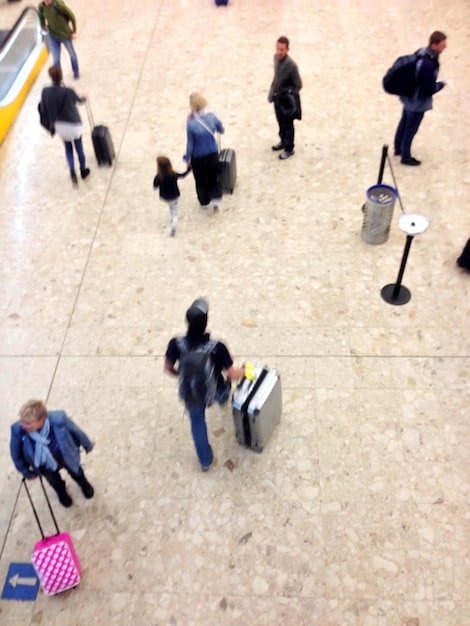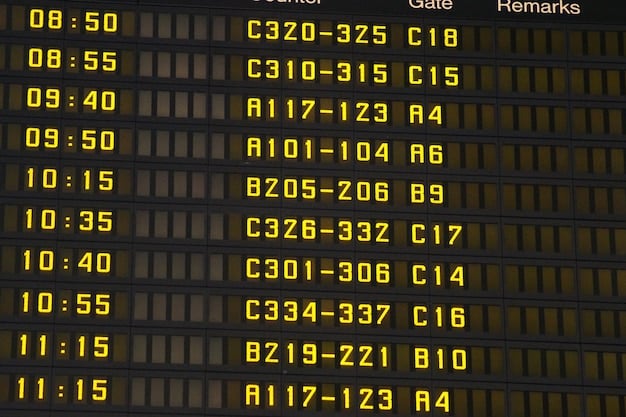US Airline Passenger Rights: Your Guide to Compensation

US Airline Passenger Rights ensure that travelers are protected when flights are delayed, canceled, or when they experience issues like lost baggage, entitling them to compensation and assistance in specific situations governed by federal regulations.
Navigating air travel can be challenging, but understanding your US Airline Passenger Rights is crucial. Know what protections you have if your flight faces delays or cancellations.
Understanding Your US Airline Passenger Rights
When you purchase a plane ticket, you are entering into a contract with the airline. This contract includes certain rights that protect you as a passenger, especially when things don’t go as planned. Understanding these rights can help you navigate disruptions and get the compensation and assistance you deserve.
These rights are primarily governed by the US Department of Transportation (DOT), ensuring some level of standardization. Let’s delve into the specifics of what you should know to be an informed traveler.
What are the Basic Passenger Rights?
Airline passenger rights in the US cover various situations, including delays, cancellations, baggage issues, and overbooking. Each situation has specific rules and airline obligations.
- Flight Delays: While airlines aren’t required to compensate you for delays, they must keep you informed about the status of your flight.
- Flight Cancellations: If an airline cancels your flight, you are entitled to a refund, including fees for optional services.
- Baggage Issues: Airlines are liable for lost, damaged, or delayed baggage, up to a certain limit.
- Overbooking: If you are involuntarily bumped from a flight, you are entitled to compensation, depending on the length of the delay.
It’s important to note that weather-related disruptions are often an exception to some of these rules, as airlines are not always held responsible for events outside their control.
Knowing your basic passenger rights empowers you to advocate for yourself during travel disruptions and seek the compensation you’re entitled to.
Flight Delays: What Are Your Entitlements?
Flight delays are a common frustration for travelers. While US regulations don’t mandate direct compensation for delayed flights, understanding your entitlements can help mitigate the inconvenience. It’s essential to know what the airlines are required to provide and what you can reasonably expect.
Let’s break down what you’re entitled to when your flight is delayed and the circumstances that affect those entitlements.
Airline Responsibilities During Delays
Airlines have a responsibility to keep passengers informed about the status of their flights, including any significant delays. This includes providing updates on the reason for the delay and estimated departure time.
- Clear Communication: Airlines must provide timely and accurate information about delays via announcements, emails, or text messages.
- Reason for Delay: They should inform passengers about the cause of the delay, such as mechanical issues, weather, or air traffic control problems.
- Estimated Departure Time: Airlines should give realistic estimates for when the flight is expected to depart.
Airlines are not legally required to provide compensation for delays, but many offer amenities like meals, hotel accommodations (for overnight delays), or transportation depending on the circumstances.

Cancellations and Refunds: Getting Your Money Back
Flight cancellations can disrupt travel plans significantly. Fortunately, US regulations offer strong protections when airlines cancel flights, particularly regarding refunds. Understanding your rights ensures you can recover your money and make alternative arrangements.
When an airline cancels a flight, knowing your refund options is essential.
Your Right to a Refund
If an airline cancels your flight, regardless of the reason, you are entitled to a full refund for the ticket price, including any optional fees for services you didn’t receive, such as baggage fees or seat upgrades.
The refund must be issued promptly, typically within 7 business days for credit card purchases and 20 days for cash or check payments.
- Full Ticket Price: The refund should cover the entire cost of your ticket, including taxes and fees.
- Optional Fees: Any fees paid for extras like baggage, seat selection, or in-flight entertainment should also be refunded.
- Prompt Processing: Airlines must process refunds in a timely manner, as defined by DOT regulations.
Many airlines will offer alternative flights as an option, but you have the right to refuse this and request a refund instead. It’s crucial to know this right so you can choose the option that best suits your needs.
Baggage Rights: What Happens When Your Luggage is Lost?
Dealing with lost, damaged, or delayed baggage can be a major headache when traveling. US regulations provide specific protections to ensure you are compensated for any loss or inconvenience. Knowing these rights can help you navigate the claims process and receive fair compensation.
Knowing what steps to take when your baggage is mishandled is crucial for a smooth resolution.
Filing a Claim for Lost Baggage
If your baggage is lost, you should immediately file a claim with the airline. This typically involves completing a form at the airline’s baggage service office, providing details about your luggage and its contents. Airlines are liable for lost, damaged, or delayed baggage, up to a certain limit, which is periodically updated by the DOT.
- File Immediately: Report the lost baggage as soon as you realize it’s missing.
- Provide Details: Offer a detailed description of your luggage and its contents to aid in the search.
- Keep Records: Retain copies of your baggage claim form and any other documentation related to the loss.
Airlines may offer an initial payment to cover immediate expenses while you wait for your baggage. If your baggage is declared lost, the airline is responsible for compensating you for the value of its contents, considering depreciation.
Overbooking: Your Rights When Bumped From a Flight
Overbooking is a common practice among airlines to compensate for no-shows. However, it can lead to passengers being involuntarily bumped from their flights. US regulations provide specific protections for passengers who are bumped, ensuring they receive compensation and assistance.
Learning what steps to take if you find yourself bumped can help you get the compensation you deserve.
Compensation for Involuntary Bumping
If you are involuntarily bumped from a flight due to overbooking, you are entitled to compensation. The amount of compensation depends on the length of the delay in reaching your final destination. The DOT has specific rules about how much airlines must pay, based on the ticket price and the delay duration.
- Determine Eligibility: Understand the criteria for compensation, including the reason for the bumping and the length of the delay.
- Know Compensation Amounts: Be aware of the compensation amounts based on the delay duration, as set by DOT regulations.
- Request in Writing: If the airline doesn’t offer compensation upfront, request it in writing.

Passengers who are bumped are also entitled to be rebooked on the next available flight to their destination. If the airline can’t provide a flight on the same day, they must also cover the cost of accommodation and meals.
Making a Complaint: How to Seek Further Assistance
If you feel that an airline has violated your passenger rights or has not adequately addressed your concerns, you have the right to file a complaint. Understanding the complaint process can help you seek further assistance and potentially receive additional compensation.
Knowing where and how to file a complaint can be crucial in resolving disputes.
Filing a Complaint with the DOT
If you are not satisfied with the airline’s response, you can file a complaint with the US Department of Transportation (DOT). The DOT reviews complaints and may take enforcement action against airlines that violate passenger rights. To file a complaint, visit the DOT’s website and complete the online form.
- Gather Documentation: Collect all relevant documents, including tickets, baggage claim forms, and correspondence with the airline.
- Be Specific: Clearly explain the issue and how the airline violated your rights.
- Submit Online: File your complaint through the official DOT website.
In addition to filing a complaint with the DOT, you can also consider seeking assistance from consumer advocacy groups or legal professionals. These resources can provide guidance and support in resolving complex issues with airlines.
| Key Point | Brief Description |
|---|---|
| ✈️ Flight Delays | Airlines must inform passengers, but compensation is not always required. |
| 🚫 Cancellations | Passengers are entitled to a full refund for cancelled flights, including fees. |
| 💼 Baggage Issues | Airlines are liable for lost, damaged, or delayed baggage, up to a limit. |
| 💺 Overbooking | Compensation is required if you’re involuntarily bumped due to overbooking. |
Frequently Asked Questions about US Airline Passenger Rights
▼
If your flight is severely delayed, ask the airline for updates and amenities like meals or accommodation, especially for overnight delays. Document all expenses, as some airlines may offer reimbursement. Understand that compensation isn’t always mandated but is worth pursuing if the airline caused the delay.
▼
Generally, airlines aren’t required to compensate passengers for delays caused by weather. However, they should still provide assistance and keep you informed about the delay’s status. Check if your travel insurance covers weather-related delays for potential reimbursement of expenses.
▼
If your baggage is damaged, report it to the airline immediately and file a claim. The airline is liable for the damage and may offer to repair or replace the item. Document the damage with photos and keep any receipts related to the baggage.
▼
Airlines can change flights, but they should notify you of any significant changes, such as a different departure time or airport. If the change is significant, you may be entitled to a refund if you choose not to accept the new flight.
▼
If you’re denied boarding due to overbooking, ask the airline for written confirmation that you were bumped. You’re entitled to compensation, the amount of which depends on the length of the delay to your final destination. The airline should also rebook you on the next available flight.
Conclusion
Understanding your US Airline Passenger Rights is essential for navigating the complexities of modern air travel. By being informed about your entitlements regarding delays, cancellations, baggage issues, and overbooking, you can advocate for yourself and ensure you receive the compensation and assistance you deserve, making your travel experiences less stressful and more predictable.





